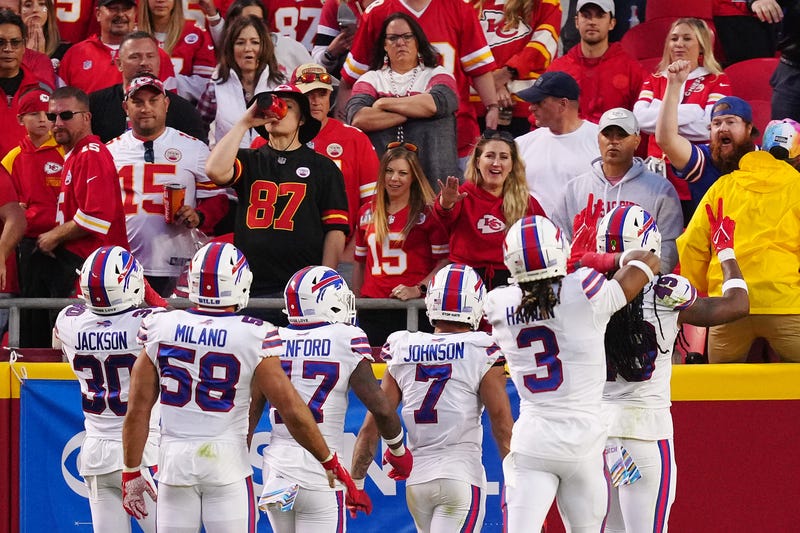
Buffalo, N.Y. (WBEN) - In a rematch of, arguably, one of the greatest playoff games ever played in football history, the Buffalo Bills managed to go to Kansas City on Sunday and knock off the Chiefs, thanks to the heroics of quarterback Josh Allen late in the fourth quarter.
While many people locally had the luxury of watching the game from the comfort of their own homes, some may have needed to watch the game elsewhere, or they missed out on it entirely.

That's because Verizon Fios customers were left in the dark this weekend due to a carrier dispute between the cable and Internet company and Nexstar, the parent company of the CBS affiliate in Buffalo, WIVB-TV.
In a statement released by Verizon on Monday:
“As of Oct. 14 at 11:59 p.m. ET, Nexstar failed to agree to fair renewal terms for its contract with Verizon, and on behalf of our customers we would not stand for their unfair demands.
"Nexstar declined an extension that we offered to continue negotiations and released a statement spreading false narratives and wrongfully placing blame on Fios. Our offer to extend stands; if Nexstar wishes to accept an extension, we can restore signals while the parties continue to negotiate so that customers can access content from Nexstar channels. ...
"We are disappointed that Nexstar was unwilling to enter into a fair agreement, leaving Verizon customers without access to programming that they value. It’s time for our leaders at the FCC and in Congress to protect consumers by holding them – and other broadcasters who frequently use this tactic – accountable. We will continue to work hard to put our customers first and come to a fair agreement with Nexstar on their behalf.
"Verizon will continue to put customers first, and is committed to coming to a fair agreement with Nexstar."
While these sorts of disputes between cable carriers and media networks are not new, it comes as a surprise to some that this dispute continues to carry on, which resulted in Verizon Fios electing to drop Nexstar stations ahead of a busy weekend.
"This is unusual that this fight has gone through the weekend and folks missed their football on Sunday," said Bloomberg reporter Chris Palmieri. "History tells us they will reach some conclusions, but it's a game of chicken between the distributor and the programmer. [We'll] see which one accepts the deal on the table first."
"As in some negotiations, which we've seen in other spaces, both sides want to prove a point. It's very much like when you look at a union negotiation, for example, in the unions say, 'We're going to threaten the strike,' and that sends a message to management of whatever entity the unions are involved with that, 'Gees, what are we going to do if they strike? We're going to have to bring in temporary workers, or we're gonna have to have a setback or whatever.' It's very similar to that," said John Di Sciullo from WBBZ-TV. "The unfortunate thing is that the customer, ultimately; imagine a senior, they're watching their television, they have their Fios and they're disrupted. And most people when they have Fios or Spectrum or other services, they bundle everything together. Some people may have their Internet tied to their television, and even tied to their phone. So if you were going to make a change, it's not just for one of the services, it could be for all three. So it's just very disruptive, and the ultimate is that the customer doesn't benefit from any of that."
Verizon is claiming during these negotiations that Nexstar is asking for a significant 63% rate increase as part of their new deal. With this coming at a time when people are watching less traditional TV, Palmieri can't see that sort of request by Nexstar actually coming through.
"It would mean, ultimately, increasing fees for Verizon customers at a time when people are very cautious about spending on these big cable packages," Palmieri said.
Palmieri adds that a deal could be struck between both Nexstar and Verizon at anytime, and he can't imagine the dispute continuing on for weeks.
Especially locally in Western New York and even out towards Rochester, this decision from Verizon to go dark on all Nexstar stations was unfortunate at a time when the NFL is already in full swing, and, perhaps, the biggest game of the season was set to take place in Kansas City.
In most cases, a move like that ahead of a big weekend in sports, for example, will prompt both sides to get a deal in place so the customers are not feeling the most negative effects. This time, though, the feud continues without a deal and a missed weekend of football, for some.
"Certainly if I were in the business of being a TV distributor or station owner, I would not want my contract to expire in the fall, because that's really the thing that's keeping people tied to the cable subscription the most is live sports, and football is the most-watched," Palmieri said. "We saw this last weekend with FOX sort of telling everybody in the New York area that they were going to lose college football, they were going to lose Sunday NFL if Altice/Optimum didn't reach a deal, and indeed they did. That kind of pressure works, both sides tell their customers to sort of write to the other company and complain, and they flash these things on the screen to say yell at Nexstar or yell at Verizon. And so it does create a lot of pressure, particularly around these big games."
With some fans without an option to watch Sunday's Bills game at home and on their couch, it forced them to find an alternative option to view the game, such as leaving the house for a neighbor's house or bar, or even going out and purchasing an over the air antenna.
If the dispute between Nexstar and Verizon continues and people are forced to watch games and other shows in alternative fashions, that could see some negative results for Fios, especially in an age where more-and-more people are cutting the cord and saying goodbye to cable services.
"More-and-more people reach out to me in the broadcast business, fans of our station, and they say, 'You know, I just cut the cable or I just cut my carriage partner, I don't want to spend what is $100, $125, $150 a month. It's a lot of money.' And you buy an antenna for $50, say, and then you've got 40 stations available. Do you get everything that you get on cable or Fios? No, but you have some interesting alternatives, and you're able to save money, particularly now in this economy. And then it becomes out of sight, out of mind," Di Sciullo said. "If Verizon Fios is not carrying, in this case, the CW, Channel 23, and WIVB, Channel 4, then the viewer finds other alternatives and says, 'Well, I can't watch the news on that station so I'll watch it on this station.' And, 'Hey, I like that anchor person or I like that reporter.' And then that station loses a viewer, even if they've been loyal for many years. So it ultimately isn't good for anybody the longer this protracts. You want to make sure in this day and age, where television viewing is so fractured, any viewer that's lost to a competitor is not a good thing. You want those eyeballs on your station."
"I'm surprised that this is going on, because Fios is not, by any means, the largest cable provider, they're almost a niche player," Palmieri added. "If you live in Buffalo, you could still maybe go over to a friend's house or go to a bar and watch the broadcast in an alternative way. And it's, again, coming at a time when people are canceling traditional cable subscriptions in favor of just getting Amazon and Netflix, or whatever. It does seem strange that this fight would be so prominent, but we're seeing it again-and-again. They tend to sort of last a little less longer than in the past, but it's still happening."
While this situation may have a significant impact on Verizon Fios and the subscription rate for people as the dispute continues, this also does not give a good look for a media network like Nexstar.
"Everybody has a value that they associated with the particular product that they offer. In this case, Nexstar offers in the Buffalo market a significant number of newscasts on WIVB and CW that comes with a cost," Di Sciullo explains. "You have a network, CBS, that offers big time programming like NFL football and some other major shows that are on the prime-time lineup that comes with a cost with however the network's negotiate their carriage with the stations. So it could be that maybe they're asking for a little bit too much, too. It could be that there's kind of greed on both sides, or maybe unrealistic expectations might be a better way to position it. Nexstar might be asking for too much money per-subscriber and then is unwilling to bend, and then this is the result of that."
Meanwhile, Palmieri feels the broadcast business is in trouble right now, especially with people watching a lot less TV. With a move like this for Nexstar and their dispute with Verizon, it may be a matter of trying to capitalize any way they can, with part of it having to do with football and its popularity.
"NBC is talking about eliminating one of the hours of prime-time. We've seen major shows like Dancing with the Stars on ABC just go to the Disney+ streaming service. We're in this sort of period of revolution in TV viewing, and all of the big networks are pushing their own streaming services. For example, NBC has Peacock, and CBS has Paramount+," Palmieri said. "So the idea that Nexstar would be fighting this hard and if it, indeed, is true asking for a 63% increase in the fees it receives from the Fios customers, there's this disconnect that I can't quite figure out how these companies feel they can get away with this."

